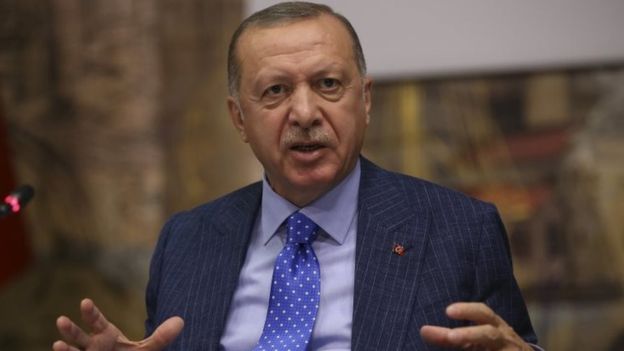
- Turkish President Recep Tayyip Erdogan has rejected a US call for an immediate ceasefire in northern Syria.
Turkish President Recep Tayyip Erdogan has rejected a US call for an immediate ceasefire in northern Syria.
Mr Erdogan’s comments come ahead of a visit to Turkey by the US vice-president and secretary of state.
Turkey launched an offensive targeting Syrian Kurdish fighters last week after US troops allied to them pulled out.
Russia, which backs Syria’s government, has meanwhile said it is trying to prevent clashes between the Turkish and Syrian armies in the region.
After four days of fighting, the Kurds agreed a deal with the Syrian government for the Syrian army to be deployed along the border to help repel the Turkish assault.
Turkey considers the Kurdish militia that leads the Syrian Democratic Forces (SDF) alliance a terrorist organisation and wants to push it away from the frontier.
Ankara also says it wants to create a “safe zone” reaching about 30km (20 miles) into Syria, where up to two million Syrian refugees currently living in Turkey could be resettled.
Critics of the Trump administration say the withdrawal of US troops from the region gave Turkey a “green light” for the offensive.
The US has repeatedly denied this, and on Monday Washington announced sanctions on Turkish ministries and senior government officials.
Dozens of civilians have reportedly been killed in the operation so far and at least 160,000 have fled the area, according to the UN.
On Tuesday, the medical charity Médecins Sans Frontières (MSF) said it had “taken the difficult decision to suspend the majority of its activities and evacuate all its international staff from north-east Syria”.
What did President Erdogan say?
“They say ‘declare a ceasefire’. We will never declare a ceasefire,” Mr Erdogan told reporters on Tuesday.
“They are pressuring us to stop the operation. They are announcing sanctions. Our goal is clear. We are not worried about any sanctions,” the president added.
President Vladimir Putin has discussed the situation with Mr Erdogan in a phone call and invited him to Russia for a working visit “in the coming days”, the Kremlin announced on Wednesday.
Mr Erdogan is also expected to meet US Vice-President Mike Pence and US Secretary of State Mike Pompeo in the Turkish capital, Ankara, on Thursday.
Mr Pence on Monday warned that the US sanctions against Turkey would worsen “unless and until Turkey embraces an immediate ceasefire” and negotiates a long-term settlement on the border.
US President Donald Trump has faced mounting pressure to take action against Turkey – a key Nato partner – including from Republicans usually loyal to his administration.
What’s the latest on the ground?
Syrian government forces on Tuesday entered the strategic town of Manbij, inside the area where Turkey wants to create its “safe zone”.
Meanwhile, Turkish troops and pro-Turkish, anti-government fighters had also been gathering near Manbij.
Over the past two years, hundreds of US troops have visibly patrolled the strategic town, but they left earlier this week.
On Tuesday, Russia – a key ally of Syrian President Bashar al-Assad – said its forces were patrolling along the “line of contact” between Syrian and Turkish forces.
Moscow describes the Turkish offensive as “unacceptable”. On Tuesday, President Erdogan and his Russian counterpart Vladimir Putin discussed the issue in a phone call.
For now, Syrian forces have not been deployed between Tal Abyad and Ras al-Ain, where Turkey has focused its efforts.
How did we get here?
Kurdish-led forces have been a key ally of the US in the fight against the Islamic State (IS) group in Syria.
They described the US withdrawal, which preceded Turkish action, as a “stab in the back”.
There are fears the destabilisation could lead to a resurgence of so-called Islamic State (IS), as thousands of former fighters and their relatives are being detained in northern Syria.
Hundreds of IS family members are said to have already escaped from one camp
Analysts say that apart from fighting IS, the Kurds were fundamental to the US in limiting the influence of rivals Russia and Iran and keeping some leverage on the ground.



